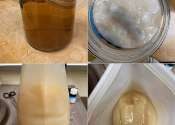Ethanol, also called ethyl alcohol, pure alcohol, grain alcohol, or drinking alcohol, is a volatile, flammable, colorless liquid. It is a psychoactive drug, best known as the type of alcohol found in alcoholic beverages and in modern thermometers. Ethanol is one of the oldest recreational drugs. In common usage, it is often referred to simply as alcohol or spirits.
Ethanol is a straight-chain alcohol, and its molecular formula is C2H5OH. Its empirical formula is C2H6O. An alternative notation is CH3-CH2-OH, which indicates that the carbon of a methyl group (CH3-) is attached to the carbon of a methylene group (-CH2-), which is attached to the oxygen of a hydroxyl group (-OH). It is a constitutional isomer of dimethyl ether. Ethanol is often abbreviated as EtOH, using the common organic chemistry notation of representing the ethyl group (C2H5) with Et.
The fermentation of sugar into ethanol is one of the earliest organic reactions employed by humanity. The intoxicating effects of ethanol consumption have been known since ancient times. In modern times, ethanol intended for industrial use is also produced from by-products of petroleum refining.
Ethanol has widespread use as a solvent of substances intended for human contact or consumption, including scents, flavorings, colorings, and medicines. In chemistry, it is both an essential solvent and a feedstock for the synthesis of other products. It has a long history as a fuel for heat and light and also as a fuel for internal combustion engines.









